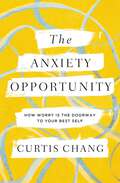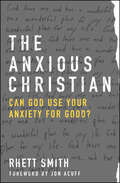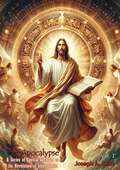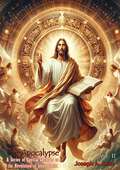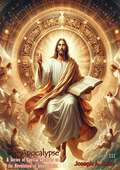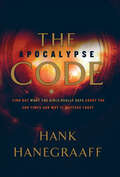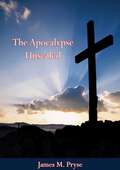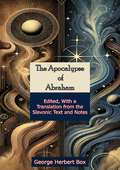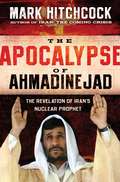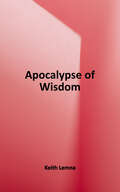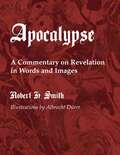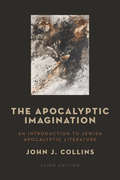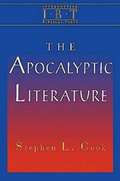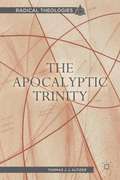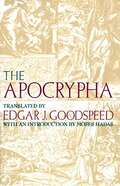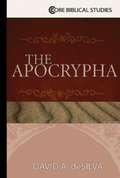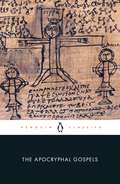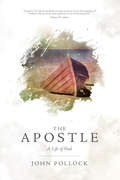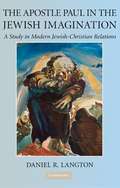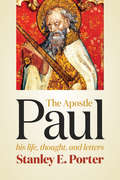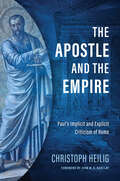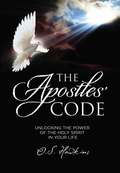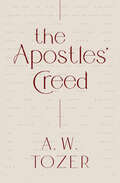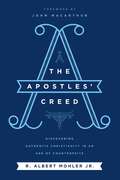- Table View
- List View
The Anxiety Opportunity: How Worry Is the Doorway to Your Best Self
by Curtis ChangWhat if instead of battling anxiety, you saw your worries as a doorway to spiritual transformation? Challenging the assumption that anxiety is the enemy, theologian, popular podcaster, and fellow sufferer of chronic anxiety Curtis Chang gives you a different framework for approaching fears. You will discover profound new ways of relating to Jesus, the Holy Spirit, and those you love.Curtis Chang knows what it's like to view anxiety as a sin to overcome. He also knows how trying to get rid of anxiety through sheer faith or willpower usually leads to feelings of shame and frustration. After losing his job as a pastor due to debilitating anxiety, Curtis began the process of healing his heart. Combining years of personal experience, spiritual practice, and biblical study, Curtis discovered an alternative approach--one that sees anxiety as the path to our best selves in Christ.For all of us who feel stuck in a never-ending war with worry, The Anxiety Opportunity offers:Biblical wisdom about how anxiety can lead to rich spiritual growthAn invitation to examine our fears as a way of pursuing our callingSimple practices for converting nervous energy into fruitful energyInsights into why trying to avoid loss generates more anxietyA renewed sense of peace as we realize what God can do through our fears It's time to think differently about the relationship between anxiety and spiritual growth. This unique and profound exploration of one of the greatest epidemics of our time shows us how anxiety can be the very place we meet Jesus--and how channeling our anxiety can help us become more like him.
The Anxious Christian: Can God Use Your Anxiety for Good?
by Rhett SmithIs anxiety &“un-Christian&”?Many Christians believe the answer to this question is yes! Understandably, then, many Christians feel shame when they are anxious. They especially feel this shame when well-intentioned fellow believers dismiss or devalue anxiety with Christian platitudes and Bible verses.Rhett Smith, Licensed Marriage and Family Therapist, helps us understand anxiety in a new way. Rhett argues that, rather than being destructive or shameful, anxiety can be a catalyst for our spiritual growth. Using Biblical thinking and personal examples, Rhett explains how anxiety allows us to face our resistance and fears, understand where those fears come from, and then make intentional decisions about issues such as career, marriage, money, and our spiritual lives.Allow this book to challenge your view of anxiety, and allow God to use your anxiety for good.
The Anxious Christian: Can God Use Your Anxiety for Good?
by Rhett SmithIs anxiety &“un-Christian&”?Many Christians believe the answer to this question is yes! Understandably, then, many Christians feel shame when they are anxious. They especially feel this shame when well-intentioned fellow believers dismiss or devalue anxiety with Christian platitudes and Bible verses.Rhett Smith, Licensed Marriage and Family Therapist, helps us understand anxiety in a new way. Rhett argues that, rather than being destructive or shameful, anxiety can be a catalyst for our spiritual growth. Using Biblical thinking and personal examples, Rhett explains how anxiety allows us to face our resistance and fears, understand where those fears come from, and then make intentional decisions about issues such as career, marriage, money, and our spiritual lives.Allow this book to challenge your view of anxiety, and allow God to use your anxiety for good.
The Apocalypse A Series of Special Lectures on the Revelation of Jesus Christ Vol. I [Revised Text] (The Apocalypse A Series of Special Lectures on the Revelation of Jesus Christ [Revised Text] #1)
by Joseph A. SeissDive into the profound mysteries of the Book of Revelation with Joseph A. Seiss's The Apocalypse: A Series of Special Lectures on the Revelation of Jesus Christ. This seminal work offers an in-depth exploration of one of the Bible’s most enigmatic and compelling books, providing readers with a comprehensive understanding of its prophetic visions and theological significance.Joseph A. Seiss, a renowned theologian and biblical scholar, brings his extensive knowledge and insightful perspective to this series of lectures. With meticulous attention to detail and a deep reverence for the scriptural text, Seiss deciphers the complex symbolism and intricate imagery found in the Book of Revelation. He guides readers through its chapters, offering clear explanations and thoughtful interpretations that illuminate the apocalyptic messages conveyed by the Apostle John.The Apocalypse covers a wide range of themes, including the nature of divine judgment, the ultimate triumph of good over evil, and the promise of a new heaven and new earth. Seiss's lectures delve into the historical context of the Revelation, its place within the broader biblical canon, and its relevance to contemporary Christian faith and practice.Throughout the book, Seiss emphasizes the hope and encouragement that the Revelation offers to believers, portraying it not as a text of fear, but as a profound source of comfort and inspiration. His eloquent and accessible writing style makes complex theological concepts understandable, inviting readers to engage deeply with the spiritual truths of the Apocalypse.Join Joseph A. Seiss in unraveling the mysteries of the Book of Revelation and discover the powerful and enduring message of hope and redemption it contains. This timeless work continues to inspire and enlighten readers, offering a profound exploration of the ultimate revelation of Jesus Christ.
The Apocalypse A Series of Special lectures on the Revelation of Jesus Christ Vol. II [Revised Text] (The Apocalypse A Series of Special Lectures on the Revelation of Jesus Christ [Revised Text] #2)
by Joseph A. SeissDive into the profound mysteries of the Book of Revelation with Joseph A. Seiss's The Apocalypse: A Series of Special Lectures on the Revelation of Jesus Christ. This seminal work offers an in-depth exploration of one of the Bible’s most enigmatic and compelling books, providing readers with a comprehensive understanding of its prophetic visions and theological significance.Joseph A. Seiss, a renowned theologian and biblical scholar, brings his extensive knowledge and insightful perspective to this series of lectures. With meticulous attention to detail and a deep reverence for the scriptural text, Seiss deciphers the complex symbolism and intricate imagery found in the Book of Revelation. He guides readers through its chapters, offering clear explanations and thoughtful interpretations that illuminate the apocalyptic messages conveyed by the Apostle John.The Apocalypse covers a wide range of themes, including the nature of divine judgment, the ultimate triumph of good over evil, and the promise of a new heaven and new earth. Seiss's lectures delve into the historical context of the Revelation, its place within the broader biblical canon, and its relevance to contemporary Christian faith and practice.Throughout the book, Seiss emphasizes the hope and encouragement that the Revelation offers to believers, portraying it not as a text of fear, but as a profound source of comfort and inspiration. His eloquent and accessible writing style makes complex theological concepts understandable, inviting readers to engage deeply with the spiritual truths of the Apocalypse.Join Joseph A. Seiss in unraveling the mysteries of the Book of Revelation and discover the powerful and enduring message of hope and redemption it contains. This timeless work continues to inspire and enlighten readers, offering a profound exploration of the ultimate revelation of Jesus Christ.
The Apocalypse A Series of Special lectures on the Revelation of Jesus Christ Vol. III [Revised Text] (The Apocalypse A Series of Special Lectures on the Revelation of Jesus Christ [Revised Text] #3)
by Joseph A. SeissDive into the profound mysteries of the Book of Revelation with Joseph A. Seiss's The Apocalypse: A Series of Special Lectures on the Revelation of Jesus Christ. This seminal work offers an in-depth exploration of one of the Bible’s most enigmatic and compelling books, providing readers with a comprehensive understanding of its prophetic visions and theological significance.Joseph A. Seiss, a renowned theologian and biblical scholar, brings his extensive knowledge and insightful perspective to this series of lectures. With meticulous attention to detail and a deep reverence for the scriptural text, Seiss deciphers the complex symbolism and intricate imagery found in the Book of Revelation. He guides readers through its chapters, offering clear explanations and thoughtful interpretations that illuminate the apocalyptic messages conveyed by the Apostle John.The Apocalypse covers a wide range of themes, including the nature of divine judgment, the ultimate triumph of good over evil, and the promise of a new heaven and new earth. Seiss's lectures delve into the historical context of the Revelation, its place within the broader biblical canon, and its relevance to contemporary Christian faith and practice.Throughout the book, Seiss emphasizes the hope and encouragement that the Revelation offers to believers, portraying it not as a text of fear, but as a profound source of comfort and inspiration. His eloquent and accessible writing style makes complex theological concepts understandable, inviting readers to engage deeply with the spiritual truths of the Apocalypse.Join Joseph A. Seiss in unraveling the mysteries of the Book of Revelation and discover the powerful and enduring message of hope and redemption it contains. This timeless work continues to inspire and enlighten readers, offering a profound exploration of the ultimate revelation of Jesus Christ.
The Apocalypse Code: Find Out What the Bible Really Says About the End Times and Why It Matters Today
by Hank HanegraaffHank Hanegraaff reveals the code to Revelation. Breaking the code of the book of Revelation has become an international obsession. The result, according to Hank Hanegraaff, has been rampant misreading of Scripture, bad theology, and even bad politics and foreign policy. Hanegraaff argues that the key to understanding the last book of the Bible is the other sixty-five books of the Bible — not current events or recent history and certainly not any complicated charts. The Apocalypse Code offers sane answers to some very controversial questions:What does it mean to take the book of Revelation (and the rest of the Bible) literally?Who are the &“Antichrist&” and the &“Great Whore of Babylon,&” and what is the real meaning of &“666&”?How does our view of the end times change the way we think about the crisis in the Middle East?Are two-thirds of all Jews really headed for an apocalyptic holocaust?The Apocalypse Code is a call to understand what the Bible really says about the end times and why how we understand it matters so much in today&’s world. &“Provocative and passionate, this fascinating book is a must-read for everyone who&’s interested in end-times controversies.&” — Lee Strobel, Author, The Case for the Real Jesus &“This book is a withering and unrelenting critique of the positions of apocalyptic enthusiasts — Tim LaHaye. Every fan of the Left Behind series should read this book. The fog will clear, and common sense will return to our reading of the Bible.&” — Gary M. Burge, Professor of New Testament, Wheaton College and Graduate School.
The Apocalypse Unsealed: Being An Esoteric Interpretation Of The Initiation Of Ioannes (classic Reprint)
by James M. PryseThe biblical Book of Revelation is not a cryptic history or prophecy, as is generally believed, but is, in fact, a manual of spiritual development. So explains theosophist James M. Pryse in this 1919 work, which seeks to uncover the hidden significance of the most misunderstood section of the Bible and reinterpret it from a modern theosophical perspective, uncovering its esoteric relationship to other ancient texts, including the Upanishads. Pryse offers a new translation of the Apocalypse based upon undisputed meanings of the original Greek text and comments on it on a verse-by-verse basis to bring to light startling new meaning in a work that many readers will have believed fully explored. Students of comparative mythology, ancient religion, and the Bible will find this an intriguing read. American journalist JAMES MORGAN PRYSE JR. (1859-1942) helped found the Gnostic Society in Los Angeles in 1925. He is also the author of Sermon on the Mount and Other Extracts from the New Testament (1899) and Reincarnation in the New Testament (1900), among other works.-Print ed.
The Apocalypse of Abraham: Edited, With a Translation from the Slavonic Text and Notes
by George Herbert BoxThe Apocalypse of Abraham, edited and translated by George Herbert Box, is a critical and scholarly presentation of one of the most intriguing apocalyptic texts from Jewish literature. This work, originally written in the post-Temple period and preserved in Slavonic, offers readers a profound vision of Abraham’s journey into divine revelation. Box’s meticulous translation and insightful commentary make this edition an essential resource for those interested in ancient religious thought, early Jewish mysticism, and apocalyptic literature.The text recounts Abraham’s visionary experience, where he is led by an angel into the heavenly realms and witnesses cosmic mysteries, divine judgments, and future events. Through symbolic imagery, the narrative reflects themes such as the problem of evil, the fate of the righteous, and the ultimate redemption of the world. Abraham’s struggle with idolatry and his search for divine truth serve as central elements in this mystical journey, showcasing the spiritual and theological ideals of the time.Box’s edition offers more than a mere translation—it provides extensive notes and scholarly insights that place the text within its historical and religious context. He explores the relationship between The Apocalypse of Abraham and other apocalyptic writings, such as the Book of Enoch, and draws connections to the broader Jewish traditions of mysticism and eschatology. His work sheds light on the text’s symbolism, theological implications, and relevance to both Jewish and Christian thought.For scholars of biblical studies, theology, and mysticism, The Apocalypse of Abraham is a valuable resource that bridges ancient tradition with modern scholarship. Box’s translation and commentary open a window into the spiritual imagination of early Judaism, offering readers a deeper understanding of the themes of prophecy, divine justice, and redemption that continue to resonate across religious traditions.
The Apocalypse of Ahmadinejad: The Revelation of Iran's Nuclear Prophet
by Mark HitchcockHe stands only 5-foot-4 and smiles incessantly. But behind that charismatic persona beats the heart of a genocidal terrorist.Meet the World's Most Dangerous ManIn his provocative, well-researched exposé of Iranian president Mahmoud Ahmadinejad, prophecy expert Mark Hitchcock unveils the insidious agenda behind this radical Shiite's regime: Ahmadinejad plans to hasten the return of the Islamic messiah by ushering in his vision of the apocalypse.His ultimate goal-driven by his fanatical ideology-is to bring the Mahdi, or Twelfth Imam, out of hiding. And he plans to do so by arming his country with nuclear weapons, then exporting the Iranian revolution to the world by destroying Israel and the United States. But there's a bizarre twist to Ahmadinejad's nightmarish intentions: This ardent zealot may well be part of God's plan to set the stage for a scenario prophesied more than 2,500 years ago. Hitchcock presents compelling evidence that Ahmadinejad's actions, including his alliances with Russia and many of Iran's neighbors, have placed his nation-and the world-on a collision course toward the war of Gog and Magog.Discover the truth about Mahmoud Ahmadinejad, his role in biblical prophecy, and what it means for the world-and you. From the Trade Paperback edition.
The Apocalypse of Wisdom: Louis Bouyer's Theological Recovery of the Cosmos
by Keith LemnaIn the present book, author Keith Lemna contributes to a growing body of scholarship and a comprehensive study of Louis Bouyer's cosmological vision. Lemna deeply explores Bouyer's sophiological and apocalyptic theology of creation, detailing his engagement with scientific, philosophical, religious-mythic, and poetic cosmologies.
The Apocalypse: A Commentary On Revelation In Words And Images
by Albrecht Dürer Robert H. SmithThe year 1998 marked the quincentennial of the publication of Albrecht Dürer's illustrated edition of the Apocalypse. Here Robert Smith provides an introduction to and a commentary on the book of Revelation that is keyed to the Dürer woodcuts.
The Apocalyptic Imagination: An Introduction to Jewish Apocalyptic Literature
by John J. CollinsOne of the most widely praised studies of Jewish apocalyptic literature ever written, The Apocalyptic Imagination by John J. Collins has served for over thirty years as a helpful, relevant, comprehensive survey of the apocalyptic literary genre. After an initial overview of things apocalyptic, Collins proceeds to deal with individual apocalyptic texts — the early Enoch literature, the book of Daniel, the Dead Sea Scrolls, and others — concluding with an examination of apocalypticism in early Christianity. Collins has updated this third edition throughout to account for the recent profusion of studies germane to ancient Jewish apocalypticism, and he has also substantially revised and updated the bibliography.
The Apocalyptic Literature: Interpreting Biblical Texts Series (Interpreting Biblical Texts)
by Stephen L. CookBiblical texts create worlds of meaning and invite readers to enter them. When readers enter such textual worlds, which are strange and complex, they are confronted with theological claims. With this in mind, the purpose of the IBT series is to help serious readers in their experience of reading and interpreting by providing guides for their journeys into textual worlds. The focus of the series is not so much on the world behind the text as on the worlds created by the texts in their engagement with readers. Nowhere is the world of the biblical text stranger than in the apocalyptic literature of both the Old and New Testaments. In this volume, Stephen Cook makes the puzzling visions and symbols of the biblical apocalyptic literature intelligible to modern readers. He begins with definitions of apocalypticism and apocalyptic literature and introduces the various scholarly approaches to and issues for our understanding of the text. Cook introduces the reader to the social and historical worlds of the apocalyptic groups that gave rise to such literature and leads the reader into a better appreciation and understanding of the theological import of biblical apocalyptic literature. In the second major section of the book, Cook guides the reader through specific examples of the Bible’s apocalyptic literature. He addresses both the best-known examples (the biblical books of Daniel and Revelation) and other important but lesser known examples (Zechariah and some words of Jesus and Paul).
The Apocalyptic Trinity
by Thomas J. J. AltizerThis book is a major step forward in radical theology via a sustained and creative challenge to conventional and orthodox thinking on the Trinity. Altizer presents a radical rethinking of the apocalyptic trinity and recovers the apocalyptic Jesus of Hegel, Blake, and Nietzsche.
The Apocrypha
by Edgar J. GoodspeedThe powerful collection of books from the Greek version of the Jewish Bible—the earliest complete version of the Bible we possess—but that were not included in the final, canonical version of the Hebrew Bible. <p><p> They were called “Apocrypha,” the hidden or secret books, and while they formed part of the original King James version of 1611, they are no longer included in modern Bibles. Yet they include such important works as The First Book of Maccabees, the Wisdom of Solomon, Ecclesiasticus, and the stories of Susanna, Tobit, and Judith, and other works of great importance for the history of the Jews in the period between the rebuilding of the Temple and the time of Jesus, and thus for the background of the New Testament. These works have also had a remarkable impact on writers and artists. Beyond this, they are often as powerful as anything in the canonical Bible. <p><p> The translation into contemporary English is by Edgar J. Goodspeed.
The Apocrypha: Message, Context, And Significance
by David A. deSilvaFor many across the world, the books of the Apocrypha are Christian Scripture. Learn more about them as you learn more about how Jesus thought and lived. Using a thematic approach, Dr. David deSilva gives a brief introduction and summary of these largely unknown and unappreciated books. In addition the book gives an overview to the social and cultural context of the world of the Apocrypha and early Christianity. After surveying the Apocrypha’s relevance and impact on Christian practices and spiritual formation, the book highlights the Apocrypha’s impact on Jesus, the New Testament, and the formation of the Early Church’s doctrines and theology. Core Biblical Studies fulfill the need for brief, substantive, yet highly accessible introductions to key subjects and themes in biblical studies. In the shifting tides of biblical interpretation, these books are designed to help students locate relevant meanings in conversation with the text. As a first step toward substantive and subsequent learning, the series draws on the best scholarship in order to provide foundational concepts and contextualized information on a broad scope of issues, methods, perspectives, and trends.
The Apocryphal Gospels
by Simon GathercoleA new translation of the oldest non-canonical Christian gospels In the early years of Christianity, several groups produced 'hidden' or 'apocryphal' gospels, alternative versions of the story of Christ. Sometimes these texts complemented the four canonical gospels of the New Testament, sometimes they subverted them and often they were completely different. Here, in the widest selection of non-canonical gospels gathered in one volume - which also includes two modern forgeries - we see the young Jesus making live birds from clay, hear his secret words of wisdom, discover gnostic cosmologies and witness the Harrowing of Hell. Preserved by their readers and attacked by their detractors, these gospels shine a fascinating light on the early Christian Church.Translated with an Introduction by Simon Gathercole
The Apostle
by John PollockThe Acclaimed, Authentic Biography of the Early Church's Greatest Evangelist--the Apostle Paul.Master storyteller John Pollock makes Paul and his amazing story freshly alive, so that you can know the greatest apostle much as Luke and Timothy did as they traveled with him. As you turn the pages, you'll sense Paul's motives, his aims and priorities; what mattered to him; and what he was willing to die for.
The Apostle Paul in the Jewish Imagination: A Study in Modern Jewish-Christian Relations
by Daniel R. LangtonThe Apostle Paul in the Jewish Imagination is a pioneering multidisciplinary examination of Jewish perspectives on Paul of Tarsus. Here, the views of individual Jewish theologians, religious leaders, and biblical scholars of the last 150 years, together with artistic, literary, philosophical, and psychoanalytical approaches, are set alongside popular cultural attitudes. Few Jews, historically speaking, have engaged with the first-century Apostle to the Gentiles. The modern period has witnessed a burgeoning interest in this topic, however, with treatments reflecting profound concerns about the nature of Jewish authenticity and the developing intercourse between Jews and Christians. In exploring these issues, Jewish commentators have presented Paul in a number of apparently contradictory ways. The Apostle Paul in the Jewish Imagination represents an important contribution to Jewish cultural studies and to the study of Jewish-Christian relations.
The Apostle Paul: His Life, Thought, and Letters
by Stanley E. PorterIn this comprehensive introduction to the apostle Paul, Stanley Porter devotes serious consideration both to the background and major contours of Paul’s thought and to the unique contributions of each of his letters. Porter begins by introducing the Pauline tradition and outlining the basics of Paul’s life, the chronology of his ministry, and his several imprisonments. Porter then discusses the background to Paul’s thought, examines some of the major themes of his writings, and treats issues concerning the Pauline epistles, such as pseudonymity and canon. Finally, Porter delves into all thirteen of Paul’s letters individually, placing them within their historical contexts and examining critical issues relating to the content and interpretation of each letter. The result is a thorough, balanced treatment of one of the most important figures in Christianity.
The Apostle and the Empire: Paul's Implicit and Explicit Criticism of Rome
by Christoph HeiligWas Paul silent on the injustices of the Roman Empire? Or have his letters just been misread?The inclusion of anti-imperial rhetoric in Paul&’s writings has come under scrutiny in recent years. Pressing questions about just how much Paul critiques Rome in his letters and how publicly critical he could have afforded to be have led to high-profile debates—most notably between N. T. Wright and John M. G. Barclay.Having entered the conversation in 2015 with his book Hidden Criticism?, Christoph Heilig contributes further insight and new research in The Apostle and the Empire, reevaluating the case for Paul hiding his criticism of Rome in the subtext of his letters. Heilig argues that scholars have previously overlooked passages that openly denounce the empire—for instance, the &“triumphal procession&” in 2 Corinthians, which Heilig discusses in detail by drawing on a variety of archaeological data.Furthermore, Heilig takes on larger issues of theory and methodology in biblical studies, raising significant questions about how interpreters can move beyond outdated methods of reading the New Testament toward more robust understandings of the ways ancient texts convey meaning. His groundbreaking work is a must-read for Pauline scholars and for anyone interested in how one of Christianity&’s most important teachers communicated his unease with the global superpower of his day.
The Apostles' Code: Unlocking the Power of God’s Spirit in Your Life (A 40-Day Devotional) (The Code Series)
by O. S. HawkinsDo you have moments when you feel defeated, scared, or hopeless? Are you looking for a way to understand the work of the Holy Spirit and create a deeper relationship with Christ? Discover the power of the Holy Spirit in your life as bestselling author O. S. Hawkins leads readers on a 40-day journey from Easter to Pentecost in The Apostles&’ Code.In this affordable paperback resource, readers will:Embark on a 40-day journey, guided by O. S. Hawkins, to discover the power of the Holy Spirit in their livesEngage with a daily reflection accompanied by a Code word for the day, an encouraging Scripture, and a prayer The digital booklet is perfect for:Church distribution to members during Ascension, Bible study groups, and worship groupsIn-person and virtual discussions of the Holy Spirit and Ascension The apostles must have felt defeated when Jesus was crucified because they abandoned Jesus and fled. Yet just a few weeks later they couldn't help but boldly speak of the things they had seen and heard. What empowered them to be willing to lay down their lives for Jesus? It was the Holy Spirit who came to live in each of them at Pentecost. And He is the same Holy Spirit who lives in each of us who trust Him for our salvation.Feel the power of the Holy Spirit in your life today, and be filled with the promise that He will never leave you or forsake you.
The Apostles' Creed
by A. W. TozerWe believe . . . an ancient creed is essential for today. A. W. Tozer derived great personal satisfaction and help from the church creeds, and he used them as he preached and taught. This new book draws on four previously published essays and several articles that have never before been published in books. Tozer brings the reader through the essential facets of the Christian faith through the Apostles' Creed:God the Father, Jesus Christ, and the Holy SpiritWhat it means that Jesus was Crucified, Resurrected, Ascended, and ReturningHow are we to understand The Communion of the Church, Forgiveness, and EternityBeginning with Why the Creeds are Still Important Today and ending with Connecting Our Creeds to Our Deeds, this book brings the reader into a rich experience of the Christian life. If you wish to study the classic truths of biblical doctrine and connect them to a vibrant spiritual life, join Tozer in a journey through The Apostles' Creed.
The Apostles' Creed: Discovering Authentic Christianity in an Age of Counterfeits
by Jr. R. Albert MohlerThe president of Southern Baptist Theological Seminary reveals how understanding and living out of the oldest summary of Christian belief leads to a confident, bold, joy-filled existence in a world of confusion and uncertainty.The Apostles' Creed has shaped and guided Christian faith for almost two thousand years. Few documents in the history of the church have similar influence on the life of ordinary believers. Shared by Protestant, Roman Catholic, and Eastern Orthodox traditions, the Apostles' Creed is perhaps the most compelling and formidable statement of Christian doctrine the world has ever known. But do we know what it really means--and how it applies to us today?In The Apostles' Creed, renowned theologian and pastor R. Albert Mohler Jr. works line-by-line and phrase-by-phrase through each section of the Creed, explaining in clear terms what it means and how it equips Christians to live faithfully in a post-Christian culture. From understanding the nature of the Trinity and the miracle of the Incarnation to the world-shaking truth of the resurrection and the hope of Christ's return, the theological heritage contained in this ancient statement has the power to shape us for vibrant and steadfast living today. The Apostles' Creed shows us how.
